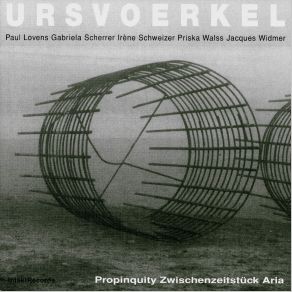Propinquity Zwischenstück Aria (feat. Paul Lovens, Irène Schweizer, Jacques Widmer, Priska Walss & Gabriela Scherrer) / Propinquity Zwischenstuck Aria (feat. Paul Lovens, Irene Schweizer, Jacques Widmer, Priska Walss & Gabriela Scherrer)
Download links and information about Propinquity Zwischenstück Aria (feat. Paul Lovens, Irène Schweizer, Jacques Widmer, Priska Walss & Gabriela Scherrer) / Propinquity Zwischenstuck Aria (feat. Paul Lovens, Irene Schweizer, Jacques Widmer, Priska Walss & Gabriela Scherrer) by Urs Voerkel. This album was released in 1997 and it belongs to Jazz genres. It contains 17 tracks with total duration of 01:55:54 minutes.

|
|
|---|---|
| Artist: | Urs Voerkel |
| Release date: | 1997 |
| Genre: | Jazz |
| Tracks: | 17 |
| Duration: | 01:55:54 |
| Buy it NOW at: | |
| Buy on iTunes $19.99 | |
Tracks
[Edit]| No. | Title | Length |
|---|---|---|
| 1. | Propinquity-7 (feat. Paul Lovens) | 9:50 |
| 2. | Propinquity-8 (feat. Paul Lovens) | 12:11 |
| 3. | Propinquity-13 (feat. Paul Lovens) | 4:51 |
| 4. | Propinquity-15 (feat. Paul Lovens) | 16:24 |
| 5. | Propinquity-16 (feat. Paul Lovens) | 10:09 |
| 6. | Propinquity-20 (feat. Paul Lovens) | 5:43 |
| 7. | Aria 1 (feat. Gabriela Scherrer, Jacques Widmer & Priska Walss) | 3:42 |
| 8. | Zwischenzeitstück 1 (feat. Irène Schweizer) | 4:02 |
| 9. | Aria 2 (feat. Gabriela Scherrer, Jacques Widmer & Priska Walss) | 9:30 |
| 10. | Zwischenzeitstück 2 (feat. Irène Schweizer) | 4:15 |
| 11. | Aria 3 (feat. Gabriela Scherrer, Jacques Widmer & Priska Walss) | 6:08 |
| 12. | Zwischenzeitstück 3 (feat. Irène Schweizer) | 3:18 |
| 13. | Aria 4 (feat. Gabriela Scherrer, Jacques Widmer & Priska Walss) | 6:30 |
| 14. | Zwischenzeitstück 4 (feat. Irène Schweizer) | 3:29 |
| 15. | Aria 5 (feat. Gabriela Scherrer, Jacques Widmer & Priska Walss) | 7:56 |
| 16. | Zwischenzeitstück 5 (feat. Irène Schweizer) | 4:02 |
| 17. | Nomis (feat. Irène Schweizer) | 3:54 |
Details
[Edit]This double CD comprises three pieces and two different musical formations. The first, "Propinquity," features Voerkel's extraordinarily original piano stylings in concert with longtime mate Paul Lovens drumming. Consisting of eight sections, each with a different harmonic starting point and rhythmic counterpoint, the nuances of "Propinquity" are reliant on two opposites: the percussive aspects of the piano, which in Voerkel's case are played with elegance and grace, and the melodic, singing, and even vocal aspects of the drum kit. Lovens is well-suited here, as he has never been given to being just a rim-shot drummer. Hence the beginning of a linguistic syntax that transposes itself many times in the course of an hour. The underlying harmonic frameworks are set into motion with small, spare chords, traced over in timbral formation and allowed to be deconstructed by the new melody entering the harmonic body from the percussion — both drums and piano. When the bridge is crossed, a variation figure is erected by the new melodic voice (drums) and harmonically extended in terms of interval and rhythm by the piano. The end result is a chameleon-like structure of wonder and spatial invention. On "Aria" and "Zwischenzeitstück," the band is expanded to include voice, trombone, and a pair of drummers, one of whom is pianist Irene Schweizer. In the "Aria" section which introduces the piece, voice and piano are intrinsic elements, companions rather than contrapuntal extensions of one another. Wordless singing reaches across the voice of a trombone and large, 11-note chords in the middle register to create a kind of musical breathing. In the final section, which overlaps with the "Aria," jazz piano cadences from the Horace Tapscott and Thelonious Monk books hover above a pair of drummers, and a seemingly intervallically inserted trombone continues in a round. The accents create a pointillistic display of interplay and conversation, elongating each idea as it makes its way across the ensemble. The "Aria" returns to create a harmonic basis from which to begin again. There is no conclusion here, only a series of stated voices carrying on in both insistent and languid conversation with the hope, one can assume, of integrating more fully into a seemingly organic whole. The degree to which that process succeeds is a tribute not only to the musicians involved but especially to Voerkel, whose calm, evenhanded command of the band allowed the maximum amount of expression with the least amount of cacophonous tension.